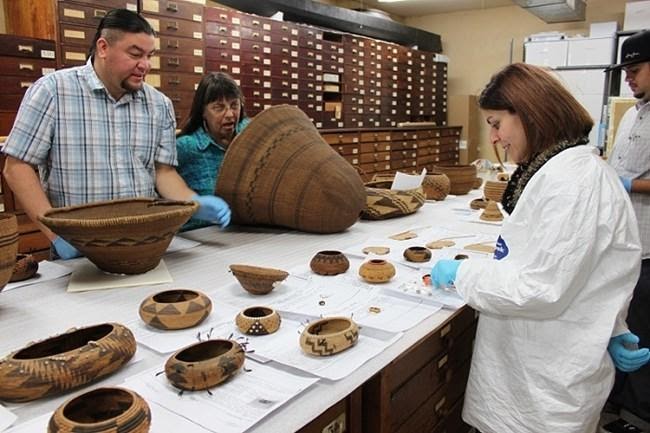Park Connections
By: Sandhya Narayanan
My primary task for my internship this summer is to help build connections between Salem Maritime/Saugus Ironworks National Historic Sites (SAMA and SAIR respectively) with local tribes. Over the course of doing this outreach, and after many phone calls, I realize that the idea of a “relationship” or “partnership” is infinitely more complicated and nuanced than either words suggest.
Parks have a federal mandate and social responsibility to build relationships with local tribes. Building such relationships, after all, is the foundation that can lead to long-standing consultation practices, changing park interpretation narratives, and setting the stage for future collaborations such as archaeological excavations. Furthermore, having an established relationship or partnership also helps ease the transfer of objects or funerary remains per NAGPRA guidelines.

Partnership and consultation from San Diego Museum of Man; found on the NPS website
From the perspective of parks, these are the types of engagements and benefits that can come out of a healthy relationship with local and neighbouring tribes. But these same things are not necessarily the same priorities for many tribes, nor what they want out of a relationship with a national park or national historic site. For some of the tribes that I was in contact with during this summer, building a relationship meant creating educational programs for Native youth, so that they might one day become active caretakers within the park, and not simply outside consultation partners. Others wanted to see the space or parts of the space either kept separate from or designated specifically for Native use, such as organization of Powows, gatherings, and other celebrations or events. With many of the individuals that I spoke with, a good partnership was something that could only be achieved through rethinking how objects and even park decisions are made. For these individuals, a true partnership is one where conversations with tribes are not only continuous, but designed where Native partners are involved in decision making processes involving the park projects right from the get-go.
Yet, the simplest requisite for a good partnership is….to care about the needs and issues of the tribes themselves. Each tribe not only has their own history with a park, but also has their own history of achieving recognition with the federal and state governments. Each community has their own needs that corresponds to these histories, and current pressures that everyone faces today. For some tribes, the most important issue could be the process of getting federal or state level recognition.

Seal of the Massachusett Tribe at Ponkapoag
For many, including the four tribes within Massachusetts, raising awareness of the offensive and inappropriate use of Native American mascots is particularly pressing. [As someone who went to high school in New England, I remember competing against many schools whose mascot was the “Sachem”, a title that is to this day reserved for Native American tribal leaders].

“Sachems” is the mascot name for Winchester High School, in Winchester, MA. For more on discussions for the removal of the mascot for Winchester, check out this op-ed.
The bottom line here is that a true partnership means demonstrating through each contact that you care and truly hear what the concerns of these communities are, regardless if they are related to the park interests or not. Some of these conversations could involve park participation, such as providing support for conversations about Native American mascots and imagery. Other conversations don’t have to have a final end. Almost all of my conversations with folks at some point focused on COVID-19, if everyone is safe, and our general concerns and worries about the pandemic. These are conversations that do not entail any type of transactional support between the park and the community, but they are conversations that ultimately connect humans with each other, to openly talk about things that matter to everyone: our health, our safety, our family, and our dignity as humans.
As an intern, I have been fortunate to begin navigating both these spaces: cognisant of the mandates for the park at the federal level, but also understanding that such a relationship requires that we (as individuals and as institutions) must learn to give more in whatever and any capacity if we wish to attain a relationship down the line.
